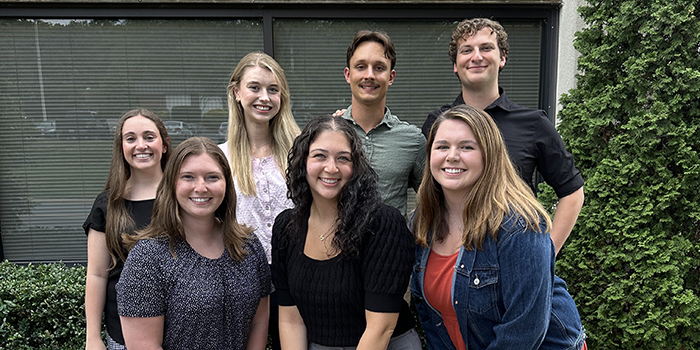
For further information about the concentration, please contact
Dr. Trevor Stokes stokestf@jmu.edu
Purpose
The behavior analysis concentration is for students interested in pursuing course work and experience requirements to qualify for examination to become a master's-level Board Certified Behavior Analyst (BCBA®). Most of our master’s graduates work in human services, clinical and educational settings as licensed behavior analysts.
In 2014, this program converted from an experimental analysis of behavior program to an applied behavior analysis program. All program graduates from the past ten years have passed the BCBA examination on their first examination, demonstrating that JMU’s program is a top quality BCBA producing university. This exam is overseen by the Behavior Analysis Certification Board (BACB). The pass rate data can be found in this link: https://www.bacb.com/university-pass-rates/
Overview
In this concentration, students will complete course work, conduct research and participate in practicums designed to facilitate mastery of major concepts, principles, practices, and theories in applied behavior analysis, the experimental analysis of behavior and the philosophy of radical behaviorism. Students in this concentration are required to complete their research apprenticeship and thesis requirements through collaborative research activities with faculty who approach the scientific study of behavior from a behavior-analytic conceptual and theoretical framework.
Program Curriculum
This two-year, 36-credit hour on-campus master’s program requires coursework in the following.
Methods and Research Core: (6 credit hours)
Psyc 700. Thesis research (3 credits)
Psyc 805. Single case experimentation (3 credits)
Content Courses: (9 credits)
Psyc 610. Applied Behavior Analysis (3 credits)
Psyc 690. Experimental Analysis of Behavior (3 credits)
Psyc 689. Ethics and Professional Development on ABA (3 credits)
Concentration and Elective Courses:(21 credits)
Psyc 601. Special Topics in Psychology - Behavior Assessment and Intervention (3 cr)
Psyc 601. Special Topics in Psychology – Organizational Behavior Management (3 cr)
Psyc 601. Special Topics in Psychology – Behavior Theory. (3 credits)
Psyc 695. Practicum in ABA (12 credits)
Other experiences
Students in the behavior analysis concentration may participate in the activities of various local, regional, national and international agencies, groups and professional organizations that advance the scientific study of behavior and its humane application to solve practical problems. For example, all students present their research at the annual conference of the Virginia Association for Behavior Analysis.
Practicum experiences of 25 hours per week across each of the two 10-month academic years are conducted in a variety of settings. Students have completed their community practicum hours in the public-school districts of the Shenandoah Valley, and the VIA Centers for Neurodevelopment. JMU on-campus practica are completed in the clinics of the Alvin V. Baird Attention and Learning Disabilities Center.
Students have enjoyed the variety of experience opportunities as they are placed in a different setting each year. Placements are determined by the program advisor.
Student Statistics
|
Statistic |
2025 |
2024 | 2023 | 2022 | 2021 |
|
Number of students whose degrees were conferred by the program |
3 | 4 | 4 | 2 | 3 |
|
Median years until graduation for students whose degrees were conferred by the program |
2 | 2 | 2 | 2 | 2 |
|
Number of students enrolled in the program on January 1st of the reporting year |
7 | 7 | 8 | 6 | 5 |
|
Number of students no longer enrolled in the program on January 1st for any reason other than conferral of degree |
0 | 0 | 0 | 0 | 0 |
|
Number of completed applications received |
21 | 19 | 15 | 15 | 13 |
|
Number of students admitted during the reporting year |
5 | 4 | 3 | 4 | 4 |
|
Number of first-time candidates sitting for their Board-Certified Behavior Analyst (BCBA) examination |
3 | 4 | 4 | 2 | 3 |
|
Percentage of first-time candidates passing the BCBA certification examination |
100% | 100% | 100% | 100% | 100% |
|
Number of graduates obtaining a master-level state license as a behavior analyst |
3 | 4 | 4 | 2 | 3 |
|
Median undergraduate grade point average (GPA) for applicants admitted |
3.67 | 3.75 | 3.25 | 3.73 | 3.4 |
|
Statistic |
2020 | 2019 | 2018 | 2017 | 2016 |
|
Number of students whose degrees were conferred by the program |
2 | 3 | 4 | 3 | 2 |
|
Median years until graduation for students whose degrees were conferred by the program |
2 | 2 | 2 | 2 | 2 |
|
Number of students enrolled in the program on January 1st of the reporting year |
5 | 7 | 7 | 5 | 5 |
|
Number of students no longer enrolled in the program on January 1st for any reason other than conferral of degree |
0 | 0 | 0 | 0 | 0 |
|
Number of completed applications received |
11 | 20 | 15 | 7 | 14 |
|
Number of students admitted during the reporting year |
2 | 3 | 4 | 3 | 2 |
|
Number of first-time candidates sitting for their Board-Certified Behavior Analyst (BCBA) examination |
2 | 3 | 4 | 3 | 2 |
|
Percentage of first-time candidates passing the BCBA certification examination |
100% | 100% | 100% | 100% | 100% |
|
Number of graduates obtaining a master-level state license as a behavior analyst |
2 | 3 | 4 | 3 | 2 |
|
Median undergraduate grade point average (GPA) for applicants admitted |
3.40 | 3.62 | 3.42 | 3.57 | 3.42 |

